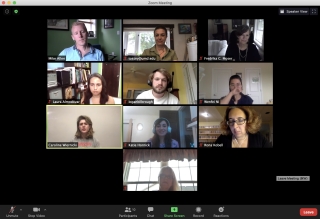Knauss legislative fellowships in Congress help build careers — and they're fun and educational. See our video and fact sheet for details.
A Year in Washington, DC, From Afar: Knauss fellows adapt to unexpected changes
Every year, Maryland Sea Grant welcomes its new class of Knauss fellows–graduate students in science fields who want deep experience in how to shape federal policy.
But like everyone else, the 2020 Knauss fellows are not having the year they expected.
Most years, the fellows spend their year in Washington, DC, working for federal agencies or congressional representatives focusing on ocean and Great Lakes issues. This year, the fellows began their tenure in the federal agencies, but quickly ended up working from home–and in some cases, home was a new place.
Because the fellowship relies on a lot of now-cancelled in-person networking opportunities, the Knauss team has played a more active role in organizing events than they have in the past, according to Hallee Meltzer, a communications specialist with NOAA’s National Sea Grant Office. Virtual events include professional development panels to learn about offices within NOAA and ask the leadership questions; the fellows will even get an audience with NOAA Acting Chief Scientist Craig McLean. The virtual setting has fostered some creative ways of staying connected, Meltzer said. Past fellows are mentoring current ones. Fellows are also hosting virtual social events such as online movie-watching parties and even “The Great Knauss Bake-off,” a virtual cooking competition with weekly challenges.
This year’s fellows are:
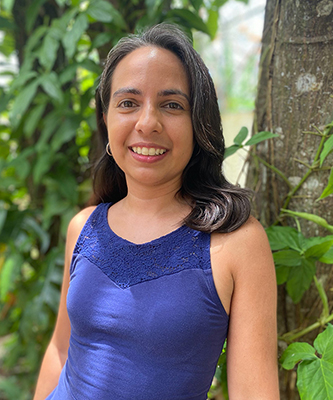
Laura Almodóvar-Acevedo, who is serving as a legislative fellow for the office of U.S. Rep. Alan Lowenthal of California’s 47th District. She is also researching habitat use of juvenile black sea bass in the Chesapeake Bay for her PhD. She is studying at the University of Maryland, Eastern Shore and is specializing in ecology as part of the Marine Estuarine Environmental Sciences (MEES) graduate program at the University of Maryland.
Katie Hornick, who is working in the NOAA National Marine Fisheries Service’s Office of Habitat Conservation as a habitat restoration specialist. She earned her PhD at UMCES’ Horn Point Laboratory, using molecular tools to compare genetic diversity of restored and wild oysters.
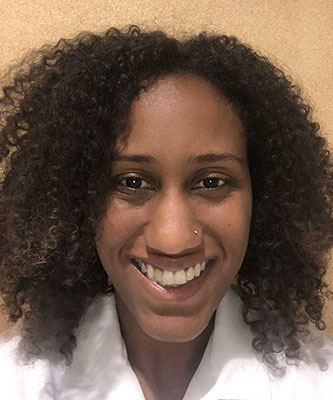
Amanda Lawrence, who is working with the U.S. Fish & Wildlife Service in the National Wildlife Refuge System for the Coastal and Marine Program to support coastal watersheds and their surrounding communities through conservation and restoration projects. Amanda completed a dual degree program receiving bachelor’s degrees in both environmental marine science and biology from the University of Maryland Eastern Shore and Salisbury University, respectively. She is completing a master’s degree in the MEES graduate program.
Wenfei Ni, who works at NOAA Research’s Climate Program Office focusing on climate science, adaptation, and resilience issues. Wenfei did her PhD work at UMCES. Her thesis work used numerical models to study the impacts of regional climate change and watershed nutrient management on Chesapeake Bay oxygen depletion zone, which she hopes can provide climate adaptation strategies for water quality restoration in the Chesapeake Bay.
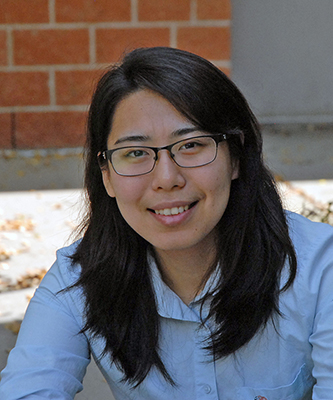
Caroline Wiernicki, who works in the Office of the Oceanographer of the Navy on interagency policy. Caroline obtained degrees in environmental science and English from Duke University. After completing her undergraduate study, she returned home to Maryland, obtaining her master’s degree from UMCES’ Chesapeake Biological Laboratory, focusing on black sea bass.
Fellowship during a pandemic
We recently caught up with four of the five fellows–Lawrence wasn’t available– and they shared a variety of experiences. Almodóvar-Acevedo, for example, is spending her Knauss Washington year several thousand miles from her Capitol Hill office in Puerto Rico.
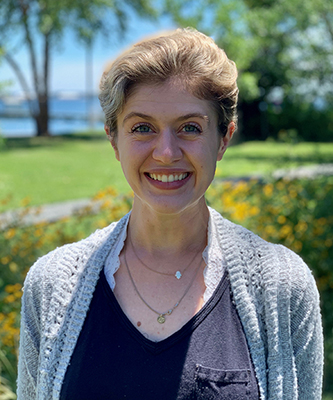
“Things pop up, and you have to kind of roll with it, and adjust your strategy,” she said of her decision to return home in the early days of the pandemic. “I try to see the silver lining of how the office adjusted. It definitely has its downfalls but it is also an opportunity to see how people dealt with the situation.”
Wenfei Ni stayed in the DC region, but she only worked in NOAA’s Silver Spring office for two weeks. Still, she says, it was helpful to get to know some of her colleagues in person before she began teleworking from her apartment.
Wiernicki, who had been telecommuting, now goes into the Office of the Oceanographer of the Navy three times a week, at the Naval Observatory. She said few employees go there, so social distancing is easy.
“I keep track of what’s happening interagency; we sort of have a finger in every pot in terms of what’s going on in marine policy. My job is to go to these meetings, get the content, and send it up the food chain,” she said.
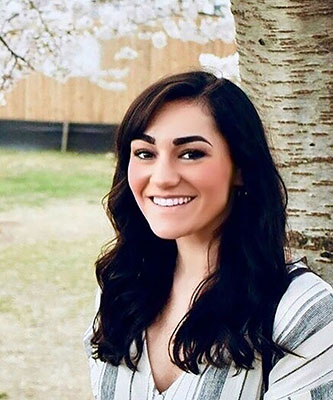
Prior to her fellowship, she had “zero experience” with the military, she said. She was amazed at the efficiency in communication. “I’m working on being a more efficient communicator, which has been great,” she added.
For Hornick, the switch to remote work has helped to put names with faces; her supervisor is in St. Petersburg, Florida, while she is in Washington, so prior to the pandemic all communication was over the phone. Now, she can see a person “instead of a disembodied voice.” Hornick’s work focuses on looking at the injuries associated with the Deepwater Horizon oil spill.
“We have working meetings. I have to lead them,” she said. “It has helped me realize I am a strategic thinker.”
Next year’s Knauss finalists were recently announced. See a full list of the 2021 finalists by state on the National Sea Grant College Program's site.
Photo, top left: A Zoom screen capture of Maryland Sea Grant Knauss fellows updating program staff on their unusual year.
All photos courtesy of the Knauss Fellows
See all posts from the On the Bay blog
